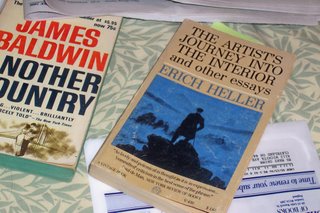Warning to my sister: I posted this already on the bookchat blog we're both on (I can hear her whining: "I've read this already!")--reposting here because I'm lazy and also because it really is such a good book.
I love global warming. Yes, it will be a bad thing, but I still love reading about it. My newest fix is Elizabeth Kolbert's
Field Notes from a Catastrophe, part of which was 1st published in 3 installments in the NYer. This is the best written one I've read so far--it's lucid, has both statistics and human data--her research is from books, monographs, interviews, travel.
She goes and looks at the permafrost (which is decreasing rapidly, causing houses in Alaska to sink or fall apart in some places) and visits the Netherlands to see firsthand how a finger in the dike isn't going to work anymore (they're building amphibious houses, that will float in a flood: seriously).
Some of the stuff in here I've read before (the 300-year drought in the Middle East that turned the mighty kingdom of Akkad into a 3-foot layer of sterile soil [dating from 2200 to 1900 BC] where there weren't even any earthworms; or the abandonment of the Viking settlement on Greenland, ditto the mystery of Roanoke), but of course this is like the 7th or 10th book I've read on GW, so that's not surprising: no one can resist Akkad. Not even me--did you know that archaeologists found a wall that had been abandoned halfway through, as if the workers said "Hey--what's with this 300-year drought--we're out of here; a kind of Marie Celeste of the desert. Kolbert quotes from a poem written about a century later--"The Curse of Akkad," which is a litany of ecological disaster. **
I highly recommend this book if you're at all interested in global warming, or the ecology, or horror.* One of the things that I've been coming to realize in all this CO2-fed reading is the fragility of what we think of as our normal climatic state. Even beyond the dire facts of the impending global warming and our sorry part in it, I've started to see that the climate of the Holocene (where we are now in the great march of geologic ages) has been very unusual in the history of the world--highly benign and conducive to the rise of civilization, etc. It's as if humanity has been unknowingly living on an extended vacation, which could be cut short at any time when the world reverts to one of its states of extreme variability.
*Scary quote: "the last time carbon dioxide levels were comparable to today's was 3.5 million years ago... and it is likely that they have not been much higher since the Eocene, 50 million years ago. In the Eocene, crocodiles roamed Colorado and sea levels were nearly 300 hundred feet higher than they are today." If I move to Cleveland Heights will I be above water?
**from "The Curse of Akkad":
The great industrial tracts produced no grain,
The inundated tracts produced no fish,
The irrigated orchards produced neither syrup nor wine,...
He who slept on the roof, died on the roof,
He who slept in the house, had no burial
People were flailing at themselves from hunger.



